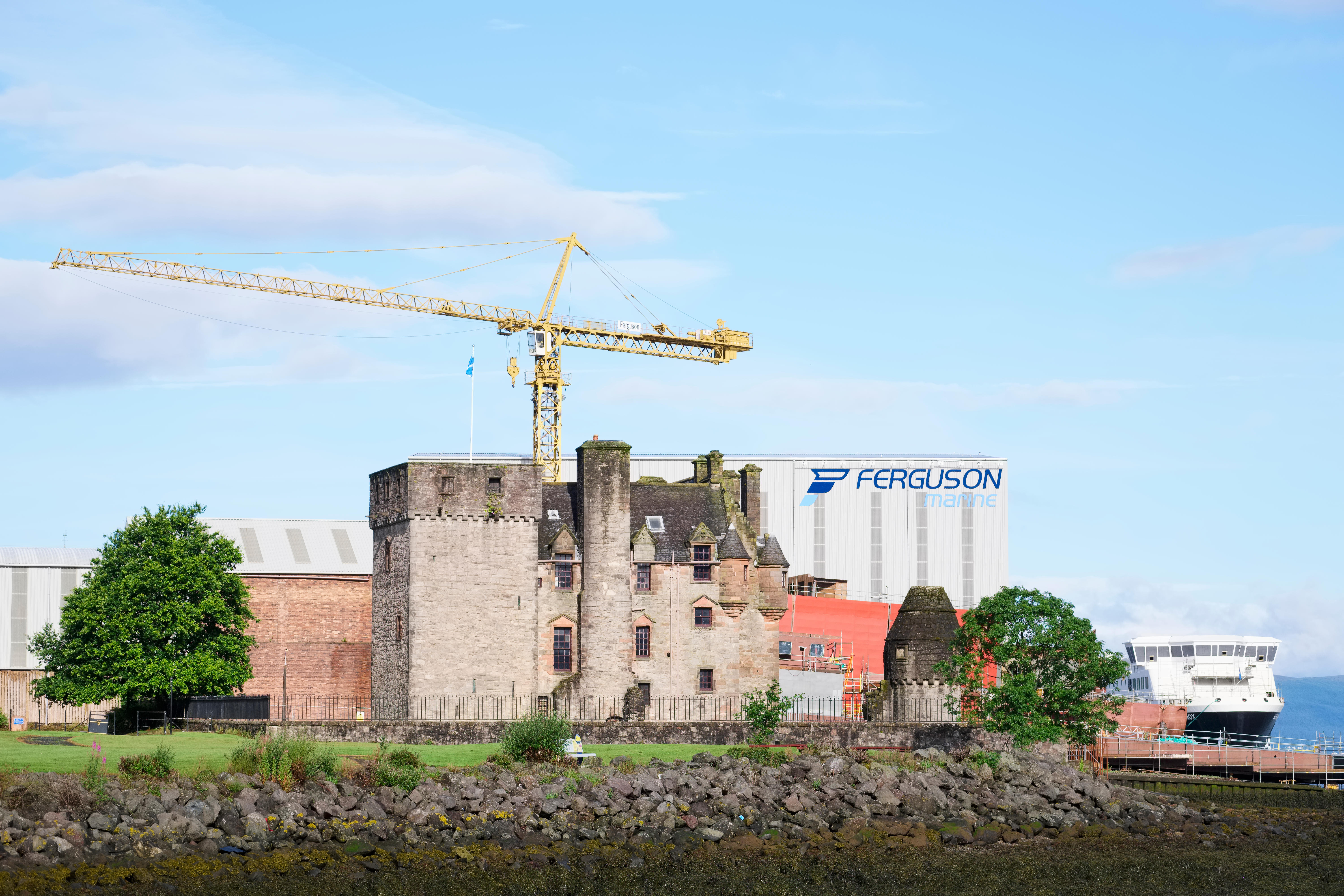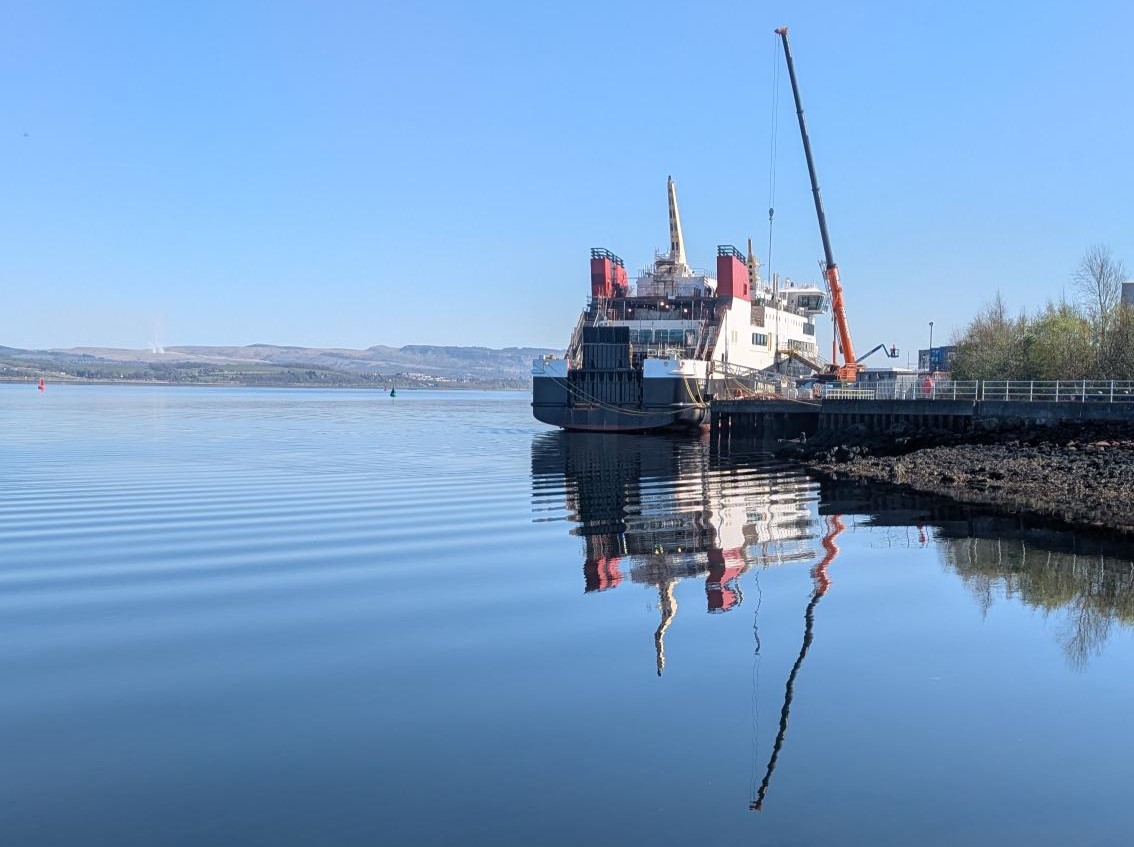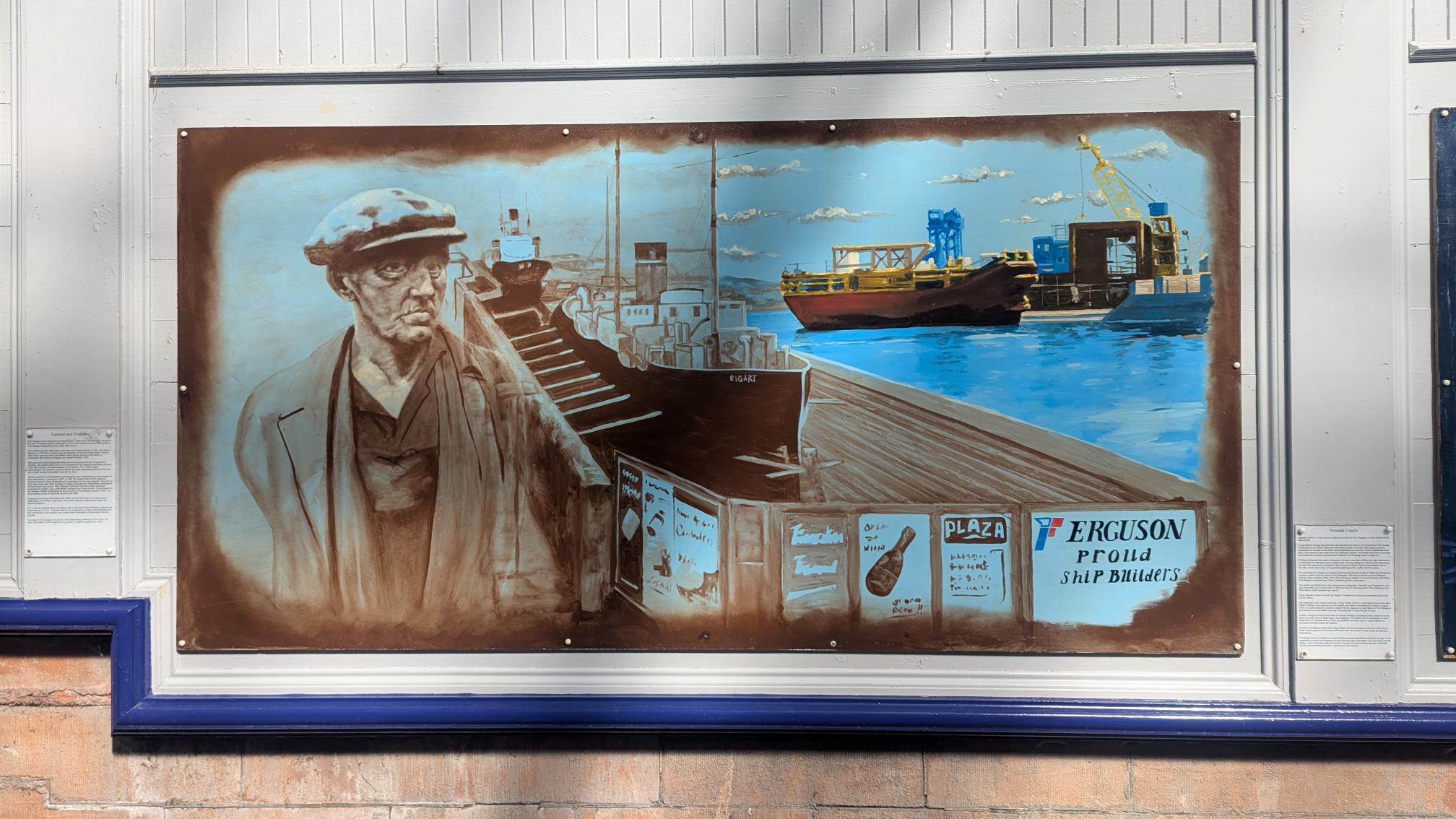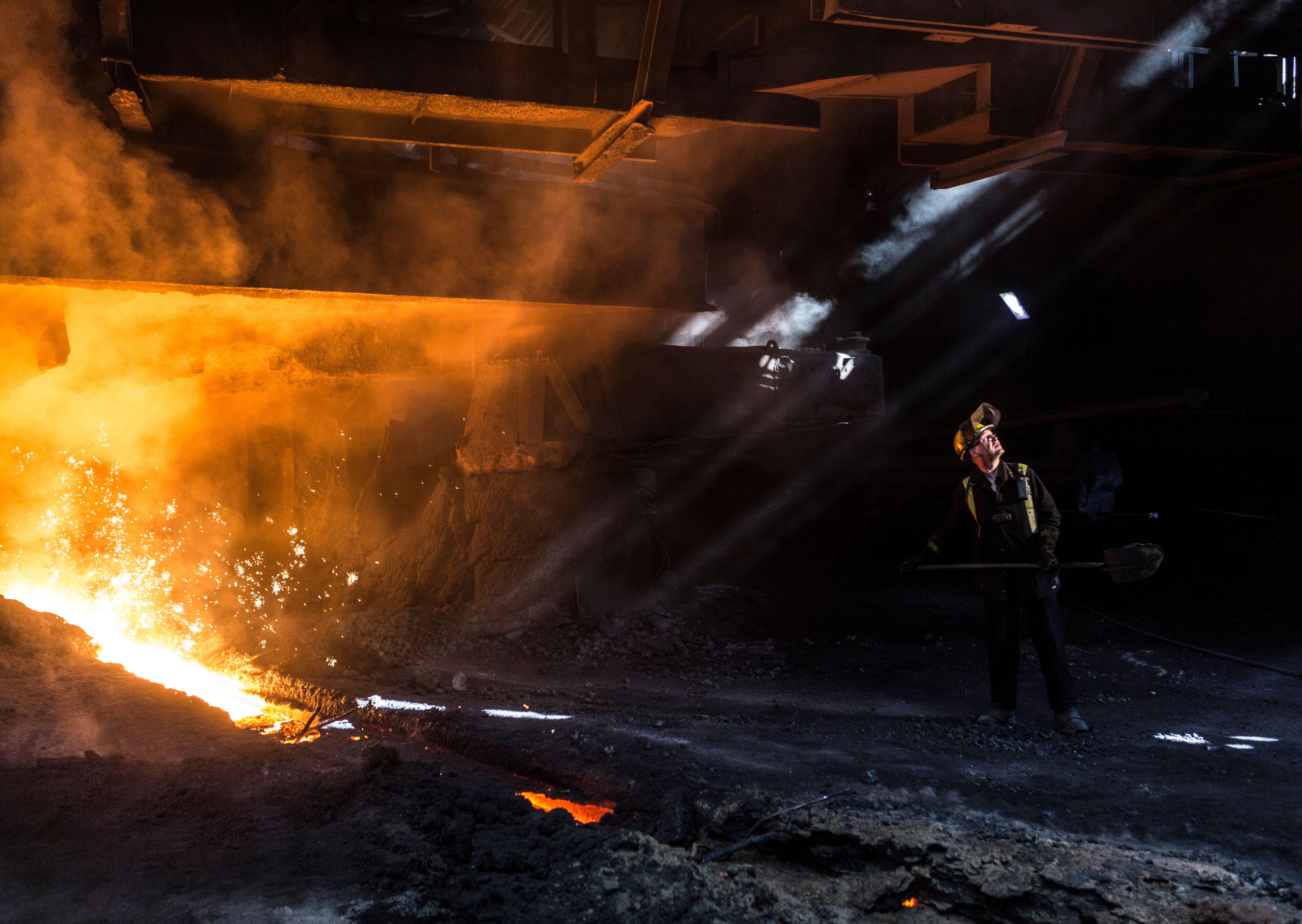Ferguson Marine and British Steel are under pressure – is heavy industry dead?
The small fishing hamlet of Newark could once be found around 20 miles to the west of Glasgow.
So named because it was nestled in the shadow of Newark Castle – built by the Maxwell family in the late 1400s and still standing today – the hamlet would, like many communities along the Clyde, be transformed into an industrial hub as global shipping brought prosperity to the west coast of Scotland. Indeed, this rapid change in fortunes is evinced in its name change in the 17th century to New Port Glasgow.
As its name suggests, the town would act as a remote port to the nearby city for more than a century. But by the time the river was artificially deepened, allowing direct access to the city, Port Glasgow had already found its new place in the world, as a centre for shipbuilding.
At its peak, shipyards along the Clyde produced nearly one fifth of the world’s ships – and Port Glasgow was responsible for a quarter of that. Even as time and technology moved on, the industry would endure for many decades, until the mass deindustrialisation wrought devastation on the area in the 1970s and 80s. Today, there is just one shipyard left on the banks of the lower Clyde: Ferguson Marine.
 Newark Castle next to the Ferguson Marine yard | Richard Johnson / Alamy Stock Photo
Newark Castle next to the Ferguson Marine yard | Richard Johnson / Alamy Stock Photo
Arriving in Port Glasgow, it is immediately clear this industrial legacy is woven into the fabric of the place. Everywhere you look there is something to commemorate it, from the murals lining the train station to The Skelpies on the riverfront, two huge steel sculptures of shipbuilders hard at work. And then of course there is Ferguson Marine itself, still going, with the under-construction Glen Rosa docked in its waters and the shouts of workers carrying across the river. It’s a reminder that this is not just history.
Local MSP Stuart McMillan needs no reminding of that fact. Like many other Port Glasgow bairns, McMillan grew up surrounded by men who worked in shipbuilding. It wasn’t always smooth sailing. He recalls his dad being unemployed for a period in the 80s – just another victim of deindustrialisation – but the sector continued to support the family for a long time. His dad was even working at Ferguson Marine itself when he died in 2001.
“When my father passed away suddenly, the workforce in the yard showed their support for the family. I’ll never forget that. My mum, certainly, she never forgot that either. And it was something that really stuck with all of us,” he says. That’s why, he says, the yard “means a huge amount to me personally. It’s not just about me as an MSP.”
But Ferguson Marine has had a tough decade, and questions remain over its long-term future. At risk of closure in 2014, the yard was saved after ministers helped broker a deal with Clyde Blowers Capital, owned by billionaire Jim McColl. A year later it was awarded the contract to build two new ferries for the Clyde and Hebrides service, but beset by problems from the start, the project was subject to serious delays and cost overruns.
Ongoing investment is needed to make the yard competitive and generate future income
The yard entered administration again in 2019, at which point the government nationalised it. Problems with the two ferries continued, and Glen Sannox would only enter service this year – seven years late – while the Glen Rosa is still unfinished and facing further delays.
And once Rosa is finished, the yard has nothing on its order book – a worry that was exacerbated in March by the news it had not won the contract to build seven new ferries as part of the government’s small vessels replacement programme (SVRP). Instead that business would go to Remontowa in Poland.
McMillan, an SNP MSP, places the blame firmly with the management. He says it was “strange” the company had assumed direct award of the SVRP in its previous business plan and goes on to suggest the yard is “not run efficiently” and management has frequently failed to engage with the workforce.
The points aren’t unfounded. Even after nationalisation the company has been through several senior staffing changes. And in a report published late last year, spending watchdog Audit Scotland said it had “serious concerns over poor governance and decision-making”. It said the future of the yard was “uncertain” and “ongoing investment is needed to make the yard competitive and generate future income”.
 Glen Rosa is still under construction
Glen Rosa is still under construction
When the failed SVRP bid was raised at First Minister’s Questions, John Swinney said the yard had put in a “credible” offer, proving it was in a stronger position. The fact it was able to take part in the tendering process is a step in the right direction. Back in 2021 it failed to make the shortlist for a separate contract that would eventually be awarded to the Cemre yard in Turkey.
Yet despite this improvement, Ferguson’s is still struggling to compete in the global market. Holyrood understands the yard ranked highly in the technical and quality assessments of the tendering process, but it lost out on price. A big part of that it is thought to be the higher wages of Scottish workers, while McMillan also points to a reliance on contractors “adding additional costs”.
Insiders say that unless something changes, the yard will only continue to lose out. There are, it is believed, two options that would help put Ferguson’s back on a sustainable footing: a direct award of phase two of the SVRP or, failing that, ensuring the wider social and economic benefits for Inverclyde are taken into account as part of the tender.
But there are legal issues associated with either option. Scottish ministers rejected calls for the phase one of the SVRP to be directly awarded, citing a fear of legal challenge under the Subsidy Control Act. It is unclear therefore whether a direct award of phase two of the programme is possible either. Meanwhile, factoring in local benefits is limited by procurement law. Public bodies are under no legal obligation to consider the social value of any bids and indeed are prevented from setting requirements which might discriminate against foreign shipyards.
If we can get a direct award for the small ferries, that puts us on a level playing field again
But Alex Logan, who has worked at Ferguson’s for 47 years and is the GMB convener for the yard, says it is imperative the government finds a way through. He argues the money invested up until this point would end up being wasted unless something changes. “It’s Scottish boats we are building for Scottish islanders, so why invest £14.2m in a yard to make it more competitive when we know the procurement laws stop us from being more competitive because the social and economic stuff doesn’t get brought into play?
“If they continue to do this, then I’m afraid it would be wasting the money invested, wasting public sector money investing in places if they’re not prepared to – I’m not saying bend the rules, but play by the rules better.”
He points to the new Procurement Act brought in by the UK Government which introduces a requirement to “maximise public benefit” when awarding public sector contracts. But there is a lack of clarity on interpretation, given the need to provide a level playing field for all bidders. In any case, Caledonian Maritime Assets Limited had said that as a Scottish body it is not covered by the legislation.
“The big thing we need is orders,” Logan continues. “If we can get a direct award for the small ferries, that puts us on a level playing field again and makes sure everything is in place. Then we can showcase the skills of the workforce that’s here before we lose any more skilled tradesmen.”
 Murals celebrating Port Glasgow's industrial past line the railway station
Murals celebrating Port Glasgow's industrial past line the railway station
For the government, the threat is not just the economic damage. With the weight of all its history and the romanticisation attached to being ‘Clydebuilt’, the last thing the SNP wants is to be the government that oversaw the death of Scottish shipbuilding.
All of this comes at a time when the UK’s wider industrial strategy – or lack of – is under the microscope. The UK Government’s emergency takeover of British Steel has thrown up a lot of the same issues for Labour. It seems increasingly likely the Scunthorpe-based steelworks will need to be nationalised, but the necessary speed and scale of the response begs the question: what made it an emergency in the first place?
“Recent events clearly highlight the absence of a coherent, long-term industrial strategy,” Joani Reid, the Labour MP for East Kilbride and Strathaven, says. “For too long, short-term fixes and inconsistent government policies have left industries vulnerable, as we’ve seen with steel manufacturing and shipbuilding. There’s been far too much playing politics by both the SNP and the Tories, rather than addressing the real, fundamental challenges facing our industrial base.”
And while naturally she welcomes the “long-term planning [and] strategic investment” coming from her own party, it’s difficult to get away from the impression that this has been a knee-jerk reaction to a situation ministers should have seen coming. And that same impression applies equally to the Scottish Government’s decision to nationalise Ferguson Marine, or Prestwick Airport, or even its involvement the sale of the Dalzell steelworks to Liberty Steel or the risk-laden support given to Lochaber smelter.
Is it not the case that it is in Scotland’s national interest that Grangemouth is protected?
The SNP has seized on the move to take control of British Steel as evidence of the UK Government only caring about infrastructure in England. Swinney has called for Grangemouth, Scotland’s last oil refinery that is due to close in a matter of weeks, to be nationalised – a move that until now had never been seriously pushed by the first minister.
Westminster leader Stephen Flynn put forward the argument in the Commons that if the move was right for Scunthorpe, “is it not the case that it is important to the workers in Grangemouth? Is it not the case that it is important to the communities in Grangemouth? And is it not the case that it is in Scotland’s national interest that Grangemouth is protected?”
This is false equivalence. For one thing, Grangemouth has a transition plan in place – backed by both governments. While that transition may not be as smooth as anyone would like, it is a far cry from the plan to shut down the furnaces at Scunthorpe altogether, with no transition at all.
For another, Grangemouth is not the UK’s last oil refinery – there are five others, all of which are more modern and efficient. By contrast, if the Scunthorpe furnaces cease operating, the UK loses its ability to make virgin steel and so would become entirely reliant on exports. This, as Reid highlights, can create “vulnerabilities” – particularly in times of global upheaval for trade.
 MPs were recalled over Easter recess to prevent British Steel from closing | Steve Morgan / Alamy Stock Photo
MPs were recalled over Easter recess to prevent British Steel from closing | Steve Morgan / Alamy Stock Photo
“The key issue is when we depend on external supply chains for goods that are essential for national security or vital public services. For example, we must ensure we can supply our own defence sector or critical infrastructure if global trade instability threatens those supply lines,” Reid says.
“The answer isn’t to insist on only building or buying British, but rather to have a balance. We should specialise in areas where we have competitive advantages and spend the resources we generate on buying from those who are best at making other goods. That’s how open trade benefits everyone.
“However, when vital industries, like shipbuilding or steel, are outsourced repeatedly, as we’ve seen with ferry contracts going to Poland and Turkey, it reflects more about failing domestic policies than the principle of free trade itself.”
Yet while UK ministers have defended the as-yet-unknown costs of rescuing British Steel by insisting the material is needed to fulfil its other ambitions of building more hospitals and more homes, it bumps up against the same issue the Scottish Government does with Ferguson Marine. It cannot guarantee public building projects will use steel made in Scunthorpe because doing so would risk falling foul of rules preventing discrimination against foreign imports.
Our industrial past is something to be proud of. But nostalgia shouldn’t dictate policy
But like the SNP and shipbuilding, Labour does not want the end of steelmaking to happen on its watch. Both industries are so bound up in what it means to be Scottish and British that doing so would be politically damaging long into the future.
Reid has more reason than most to hold tight to those historical ties. Her grandfather was Jimmy Reid, the famed trade unionist who led the work-in at Upper Clyde Shipbuilders in the early 70s. But she argues that history must not hold back the future. “Romanticism is natural, and our industrial past is something to be proud of. But nostalgia shouldn’t dictate policy.
“Instead, our history should teach us resilience, innovation, and the importance of long-term strategic thinking. We must learn from past mistakes – like underinvestment or failing to modernise quickly enough. Industries must evolve. History teaches us that successful industrial policy involves investing in skills, supporting innovation, and strategically backing sectors where Scotland can compete globally.”
Back at Ferguson Marine, Logan agrees there needs to be a much more integrated approach to industry. He says Scotland needs a national strategy for commercial shipbuilding, “and we could be the centre for that excellence”. That could include vessels not just for public transport, but freight, fishing protection, defence, and more. “When you think about it, the UK is an island nation. We need vessels, we need ships, we need shipbuilding. What you want to be doing is keeping it in-house; you want your British shipyards to be building all the ships for Britain.”
Ultimately, it’s about making the best use of the skills and infrastructure gifted to us by our industrial past to benefit future generations. Logan, who is in touching distance of retirement, says: “To walk out of here with a future for Inverclyde, a future for the school kids coming out, a future for your grandkids. That’s the legacy I want to leave for this industry, that there is a future for a yard, and you can bring your grandkids down here and say, ‘I used to work here’. That’s something I’m looking forward to.”
Holyrood Newsletters
Holyrood provides comprehensive coverage of Scottish politics, offering award-winning reporting and analysis: Subscribe